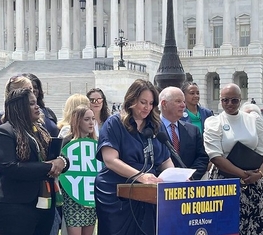Falls v. Goins
Case Summary
A Tennessee citizen whose citizenship rights had been restored following an out-of-state felony conviction had his Grainger County voter registration application denied for failing to satisfy additional conditions proving he owed no court-ordered fees or restitution. LWV Tennessee filed an amicus brief supporting the plaintiff’s appeal from a court decision ruling this additional condition was permissible under Tennessee law.
Tennessee’s state Constitution grants a fundamental right to vote unless a citizen has been convicted of an “infamous” crime, defined as encompassing all felonies including convictions in other states. Tennessee law provides three pathways for an individual to have their voting rights restored after an out-of-state conviction.
First, the individual may be pardoned or restored to rights of citizenship by the appropriate authority in the convicting state. Second, their rights of citizenship may be restored pursuant to the law of the convicting state. Third, the individual may apply to have their voting rights restored under Tennessee law. This third pathway requires the individual to satisfy certain conditions—including the payment of any court-ordered fees or restitution and applying for a Certificate of Restoration of Voting Rights. Tennessee election officials had previously agreed the other two pathways did not require obtaining a certificate.
On March 26, 2020, Tennessee's Attorney General issued an opinion concluding that people with out-of-state convictions must satisfy the additional conditions of this third pathway even when relying on one of the first two procedures for restoring their voting rights.
Plaintiff Ernest Falls was convicted of a felony in Virginia but subsequently received an individual grant of clemency restoring his citizenship rights from Virginia Governor Ralph Northam in February 2020. In June 2020, Mr. Falls’ application to register to vote in Grainger County, Tennessee was denied because he did not prove he owed no fees or restitution for his Virginia conviction. Falls, represented by the Campaign Legal Center, filed a lawsuit in the Chancery Court for Davidson County alleging the denial of his voter registration application under the Attorney General’s guidance violated his fundamental right to vote and contradicted the plain meaning of Tennessee law. Mr. Falls sought a preliminary injunction allowing him to vote in the August 6, 2020, and November 8, 2020 elections.
On July 31, 2020, the court denied the preliminary injunction. The court then granted the defendants’ motion for summary judgment, allowing the election commission’s refusal to register Mr. Falls to stand. The plaintiffs appealed this ruling to the Tennessee Court of Appeals, which affirmed the decision and reasoned that individuals convicted of felonies no longer have a fundamental right to vote in Tennessee. The plaintiffs then appealed to the Tennessee Supreme Court.
The League of Women Voters of Tennessee filed an amicus brief calling on the court to reverse election officials’ statutory interpretation as a violation of the Tennessee constitution. The brief emphasizes that the defendants’ interpretation of Tennessee law constitutes legislative overreach by implicitly and improperly requiring other states to execute Tennessee-specific laws when restoring voting rights to individuals convicted in their states. It also argues such an interpretation contradicts a logical reading of the law based on legislative history and creates a chilling effect on eligible Tennessee voters. A decision from the Tennessee Supreme Court is currently pending after oral arguments in the case concluded on October 5, 2022.
LWV Tennessee was represented in this matter by Bass, Berry & Sims PLC.
LWV Timeline
Plaintiffs file lawsuit
Plaintiffs Ernest Falls and Arthur Bledsoe file a complaint in Davidson County Chancery Court requesting a preliminary injunction determining the plaintiffs’ right to vote in the August 6, 2020 elections.
Court denies plaintiffs’ motion for preliminary injunction
The court rejects the motion for a preliminary injunction, stating that additional consideration of this matter of statutory interpretation will be required after the August 6 election.
Plaintiffs move for summary judgment
The plaintiffs request the court grant summary judgment on their claim that election officials illegally denied their applications to register to vote.
Defendants move for summary judgment
Defendants file their opposition, stating that summary judgment should be granted to them rather than to plaintiffs and repeat their argument that Tennessee’s statutes should be interpreted to require the additional conditions for registering to vote following a felony conviction regardless of which pathway to enfranchisement is used.
Court grants summary judgment to defendants
The court grants summary judgment to the defendants, ruling they properly interpreted relevant Tennessee statutes to require satisfaction of additional conditions for all individuals with out-of-state felony convictions.
Tennessee court of appeals affirms election officials’ denial of plaintiffs' voter registration application
The Tennessee Court of Appeals affirms the lower court’s decision, stating that individuals with felony convictions no longer have a fundamental right to vote under Tennessee law.
LWV Tennessee files amicus brief
LWV Tennessee files an amicus brief arguing that election officials’ interpretation of state law violates the Tennessee Constitution and creates a chilling effect on eligible Tennessee voters.
Tennessee supreme court issues opinion
In a 3-1 opinion, the Tennessee supreme court sides with election officials, ruling that Mr. Falls must repay all outstanding court costs, restitution, and child support obligations before he can vote in Tennessee.





